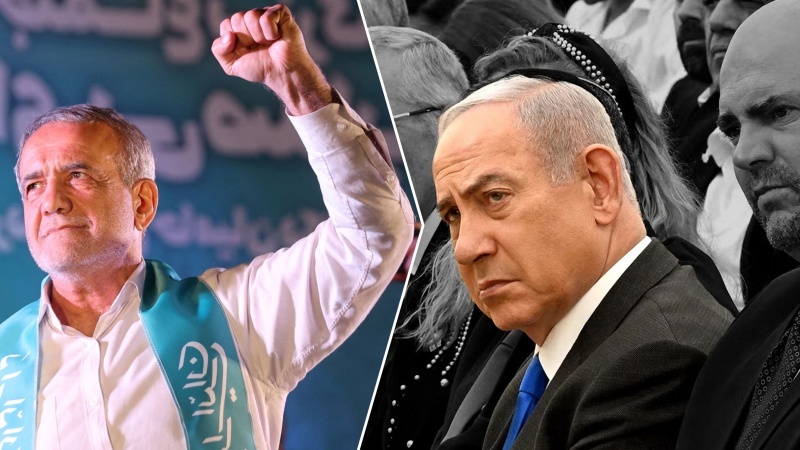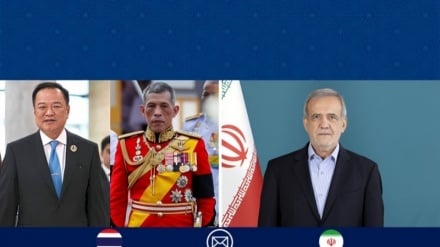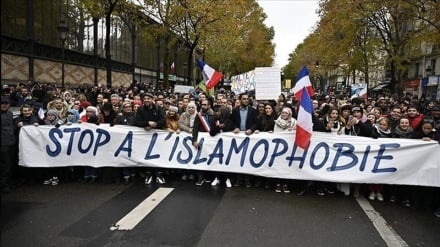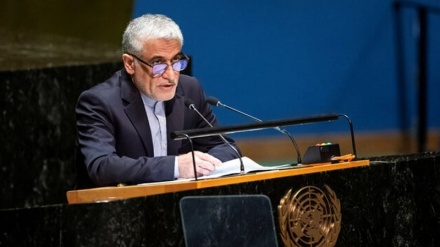Why is Israel worried about Pezeshkian's presidency?/ A look at 5 reasons from the Atlantic Council's perspective
Pars Today - An article on the Atlantic Council's website has discussed some of the reasons why Israel is worried about Masoud Pezeshkian's election as Iran's new president.
Pezeshkian's election as Iran's new president has raised serious concerns in Israel. An article titled "Pezeshkian’s election could become a burden for Israel" by Raz Zimmt has discussed the main reasons for these concerns. Here are the reasons mentioned in the article:
1. Continued support for the resistance axis
According to the author, one of the main reasons for Israel's concern about Pezeshkian's presidency is his commitment to supporting the resistance axis. In a letter dated July 8, Pezeshkian wrote to Sayyed Hassan Nasrallah, the Secretary-General of Hezbollah , emphasizing Iran's continued support for the resistance.
Pezeshkian in this letter wrote:
“The Islamic Republic of Iran has always supported the resistance of the people in the region against the illegitimate Zionist regime,” Pezeshkian wrote. “Supporting the resistance is rooted in the fundamental policies of the Islamic Republic of Iran and will continue with strength.”
2. No change in Iran's aggressive policies against the Zionist regime
Zimmt believes that Pezeshkian's election has reinforced the idea among Israelis that the new president will not make significant changes to Iran's policies, particularly regarding Israel. A Zionist researcher in response to Pezeshkian's letter to Nasrallah wrote on her X account: "If anyone here dreamed that the new Iranian president Pezeshkian would bring about a change in the militant policy of the Iranian regime that strives to destroy Israel, this letter is for you.”
3. Limited authority of the president to change all aspects of foreign policy
The author claims that in Iran's political structure, the president has more power in domestic affairs and limited ability to change foreign policy. According to him, the significant role of the Islamic Revolutionary Guard Corps (IRGC) and the Quds Force in regional resistance reduces the president's ability to intervene in this area.
Although this claim has many flaws, in most democratic countries of the world, the government alone is not the ruler of foreign policy, and national security councils as well as the country's parliaments have influence in this field through legislation. In any case, the author considers this to be one of the reasons that has led to the disappointment of the supporters of the Zionist regime in changing Iran's stance towards Israel.
4. The danger of establishing a continuous dialogue between Iran and the West for Israel
According to the author, one of the negative signs for Israel in Pezeshkian's presidency is the possible appointment of Abbas Araqchi, a former nuclear negotiator and deputy foreign minister, as Iran's foreign minister.
This appointment could increase hopes for resuming diplomatic dialogue with the West and finding a political solution to the nuclear issue, which would be detrimental to Israel.
According to this view, if an option was chosen that did not negotiate with the West, Israel could easily convince the international community that there is no benefit in negotiating with Iran and that more pressure should be applied to the Islamic Republic.
5. Concerns about Iran's nuclear and military programs
The article suggests that Iran's progress in its nuclear program, as well as the development of advanced military systems, has created strategic concerns for Israel. These concerns include progress in nuclear programs, development of long-range missiles and advanced drones. Iran's continued support for regional resistance organizations such as Hezbollah, Hamas, and Palestinian Islamic Jihad is also considered a serious threat to the security of the Israeli regime.
Conclusion
Pezeshkian's election as Iran's new president has increased concerns in Israel. His commitment to supporting the resistance axis, continuation of Iran's aggressive policies against Israel, progress in nuclear and military programs, and the development of relations between Iran and the West are all factors that have intensified Israel's security concerns.
Key phrases: Who is Pezeshkian, who is Iran's president, Iran's power, Iran-Israel war
MG/UR



